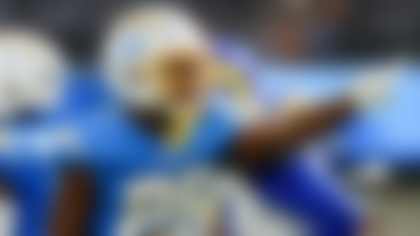MINNEAPOLIS -- Max McGee, the free-spirited Green Bay Packers receiver who became part of Super Bowl lore after a night on the town, died when he fell while clearing leaves from the roof of his home. He was 75.
Police were called to his home in suburban Deephaven on Saturday afternoon, Sgt. Chris Whiteside said. Efforts to resuscitate failed.
[
Max McGee never would have made it in Roger Goodell's NFL. Then again, neither would many of his contemporaries. From Bobby Layne through Paul Hornung and Joe Namath to dozens of lesser known players like McGee, the routine was liquor, ladies and late hours. Full story ...
"I just lost my best friend," former teammate Paul Hornung told the St. Paul Pioneer Press. "(His wife) Denise was away from the house. She'd warned him not to get up there. He shouldn't have been up there. He knew better than that."
McGee caught the first touchdown pass in Super Bowl history in 1967, a game he expected to watch from the sideline. When it was over, he had caught seven passes for 138 yards and two TDs and Green Bay -- coached by the great Vince Lombardi -- had beaten the Kansas City Chiefs, 35-10.
"Now he'll be the answer to one of the great trivia questions: Who scored the first touchdown in Super Bowl history?" Hornung said. "Vince knew he could count on him. ... He was a great athlete. He could do anything with his hands."
McGee had only four receptions for 91 yards during the 1966 regular season. He didn't plan to play in the title game against the Chiefs, because he violated the team curfew and spent the night before partying. The next morning he reportedly told Dowler: "I hope you don't get hurt. I'm not in very good shape."
Photos ...
[![internal-link-placeholder-0]](../photo/photo-gallery?chronicleId=09000d5d80376fbb)
Dowler separated his shoulder on the Packers' second drive, and Lombardi summoned McGee. He had to borrow a helmet, because he left his in the locker room. A few plays later, McGee made a one-handed snare of a pass from Bart Starr and ran 37 yards to score.
"When it's third-and-10," McGee once said, "you can take the milk drinkers, and I'll take the whiskey drinkers every time."
Jerry Kramer played 11 seasons on the Packers with McGee, and they remained friends. He said McGee's humor defused the tension on a team run by Lombardi's iron hand.
"When everyone else was looking at their feet wondering what to do, Max would come up with something," he said.
Kramer said McGee had a stubborn streak, and it was not altogether surprising he went on the roof by himself.
"It's hard to admit and distinguish the fact that you're no longer what you were, and you're no longer capable of certain activities," Kramer said. "And I think we push the limit a little bit."
Packers historian Lee Remmel recalled McGee's "great sense of timing" and his "knack for coming up with big plays when you least expected it to happen."
Lombardi once showed the team a football at a meeting and said, "Gentlemen, this is a football."
"McGee said, 'Not so fast, not so fast,"' Remmel said. "That gives you an index to the kind of humor that he served up regularly."
McGee was a running back at Tulane and the nation's top kick returner in 1953. Selected by the Packers in the fifth round of the 1954 draft, McGee spent two years in the Air Force as a pilot following his rookie year before returning in 1957 to play 11 more seasons. He finished his career with 345 receptions for 6,346 yards -- an 18.4-yard average -- and scored 51 touchdowns and scored 306 points.
After retiring from football, he became a major partner in developing the popular Chi-Chi's chain of Mexican restaurants. In 1979, he became an announcer for the Packer Radio Network with Jim Irwin until retiring in 1998.
McGee and wife Denise founded the Max McGee National Research Center for Juvenile Diabetes at the Children's Hospital of Wisconsin in Milwaukee in 1999.
According to the center's Web site, his brother fought diabetes in his lifetime, and Max and Denise's youngest son, Dallas, lives with the disease.
In addition to his wife, McGee is survived by four children and several grandchildren.
Funeral arrangements were pending.
Copyright 2007 by The Associated Press



